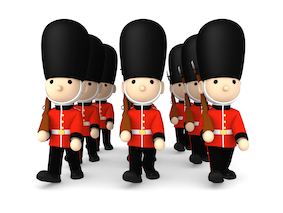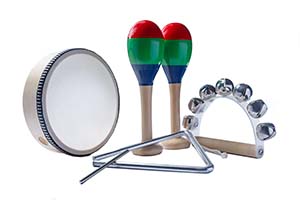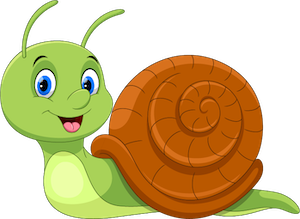Y1. Lesson 2. Practise beat
Prior learning: Beat
Duration: 30 minutes
Materials: Untuned percussion instruments, snail puppet
Keywords: Beat, singing, chanting, partners, rhymes, winding games.
Difficulty: ![]()
 Using the 'Good morning' greeting to begin every lesson is highly recommended to warm up students' voices and develop pitch skills.
Using the 'Good morning' greeting to begin every lesson is highly recommended to warm up students' voices and develop pitch skills.
 Revision
Revision
- Students will revise the song Snail, Snail.
- Students will revise the rhythm game Feet, Feet
 Melodic development
Melodic development
![]() Students discover a new song.
Students discover a new song.
- Students are seated and attentive.
- Explain that the class will learn the song Apple Tree.
- Use a neutral syllable to establish the melody, then the next time, sing the lyrics.
- Ask students to follow you as you sing again in a measured cadence.
- Ask students to keep the beat on their knees as they sing.
 Questions
Questions
- How many different sounds could you hear? [Four]
- Did some words have more than one sound on a beat?
- Which words had more than one sound?
 Rhythmic development
Rhythmic development
![]() Students practise keeping the beat using body percussion activities.
Students practise keeping the beat using body percussion activities.
 Questions
Questions
- Ask students for ideas on how else they could keep the beat.
- What other things do you know that keep a steady beat? {Clock ticking, tap dripping, etc.]
- Students form a circle, facing inwards.
- Explain there are many ways to keep the beat using your body.
- Begin by asking students to copy you as you stamp a steady beat.
- When secure, keep the beat by clapping. Students should copy your actions.
- Keep the beat by slapping your legs, touching your shoulders or head and clicking your fingers.
 Creative movement
Creative movement
![]() Students practice various poses and movements on command.
Students practice various poses and movements on command.
- Students are seated. Teach the melody and lyrics song line by line if students are not familiar with the song.
- Lead the class in singing the song and ask students to follow you.
- After the first time round, demonstrate a pose from the printouts or project the poses onto the board.
- Students will do their best to copy the pose as they sing.
- At the song's end, show another pose, and students will copy it as they sing.
- For convenience, there are eight fun poses you can print or project!
There are eight fun poses to download and print!
 Listening
Listening
![]() Students discover and improve their listening abilities by following instructions.
Students discover and improve their listening abilities by following instructions.
Ten Little Soldiers, stand up straight. [Hands facing outwards, fingers together]
Ten Little Soldiers, make a gate. [Hands clasped together, fingers interlocked in an 'X' shape]
Ten Little Soldiers, make a ring. [Hands form a circle]
Ten Little Soldiers bow to the king. [Arms apart, fingers bend 90 degrees and 'bow']
Ten Little Soldiers, run and play. [Fingers and thumbs twiddle up and down]
Ten Little Soldiers, hideaway! [Arms behind back, hands are hidden]
Ten Little Soldiers is a good fingerplay exercise for developing language abilities (rhyme) and dexterity as students learn to move their hands and fingers.
This exercise and other similar fingerplays can help with the instrumental techniques for untuned and tuned percussion, the recorder, the ukulele etc.
Finger dexterity is also of help for fine motor control involved in a pencil grip, using cutlery and dressing.

 Visual learning
Visual learning
![]()
Students sing and point to bee icons while keeping the beat.
- Project the beat icons.
- Students are seated and attentive
- Sing the song with the class, pointing to each icon on the beat.
- Students should keep the beat on their knees, shoulders or heads.
- When secure, ask a volunteer to point as the class sings.
- Repeat as time permits.
- This exercise reinforces students' development of beat by using visual cues.
 Questions
Questions
- Do some words of the song have more than one sound?
 Instruments
Instruments
![]() Students keep the beat using untuned percussion instruments.
Students keep the beat using untuned percussion instruments.

 Questions
Questions
- What other things in the classroom could make a sound to keep the beat?
- What about in the home? What can you think of that would make a great sound to keep a beat?
- Have a selection of untuned percussion instruments on your desk. These might include woodblocks, claves, cabasas, tambourines, hand drums, etc.
- Invite pairs of students to come forward and give them an instrument. Show them how to hold the instrument safely and make a clear sound.
- Instigate a beat by gently clapping, chanting or singing and ask the students to keep in time.
- Assess performances and provide gentle feedback.
- Rotate so every student can play an instrument and keep in time with the beat.
 Part work
Part work
![]()
Students keep the beat on their feet in this winding game.

- Use a snail puppet as a prop to teach the song and introduce this winding game.
- In this activity, students hold hands while you guide the class in winding around repeatedly to form a snail shell as everyone sings the song while keeping the beat in their feet.
- Instruct students not to move until the snail gently taps their head.
- As you unwind the shell and pass by each student, softly touch their head and direct them to follow the leader.
 Assess
Assess
Suggested lessons
Y1. Beat II

Y1. Beat III

Y1. Beat IV

